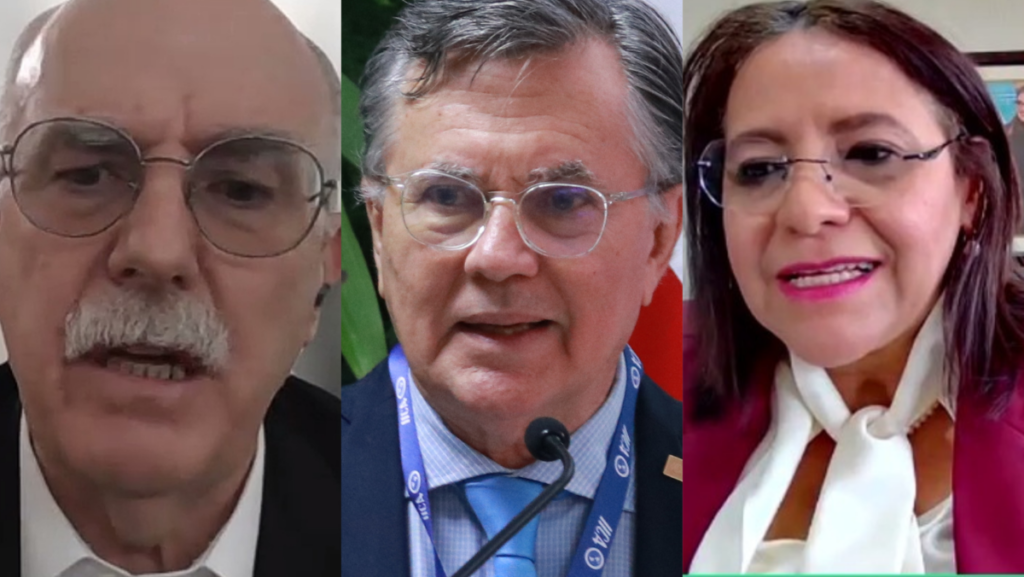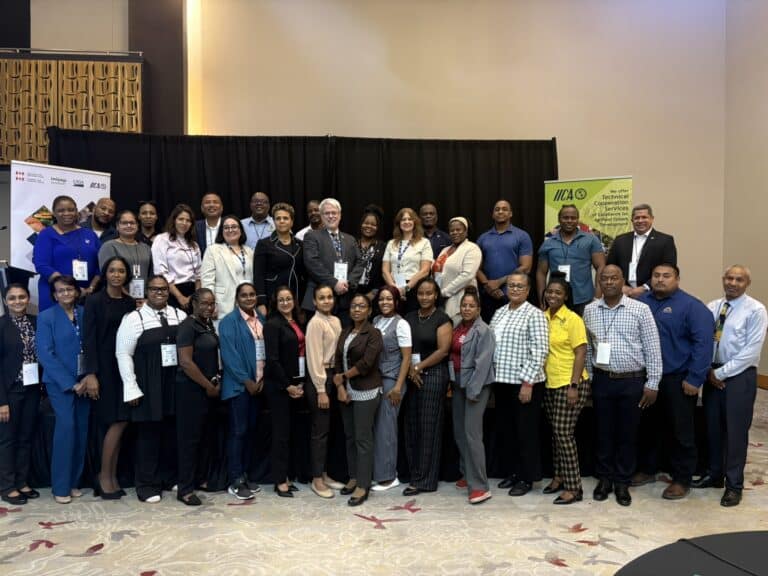
San Jose, 9 May 2025 (IICA) – The Secretaries of Agriculture of Mexico, Julio Berdegué, and Honduras, Laura Suazo, agreed that governments and international organizations must play a central role in helping small producers’ organizations in Latin America and the Caribbean navigate these times of uncertainty.
During a meeting held at the headquarters of the Inter-American Institute for Cooperation on Agriculture (IICA), Berdegué and Suazo underscored the need to generate adequate public policies to mitigate the impact of instability in international trade.
The Secretary of Agriculture and Rural Development of Mexico and the Secretary of Agriculture and Livestock of Honduras delivered virtual presentations during the hemispheric conference, whose participants discussed the scope, challenges and future of small producers’ organizations as business entities in the region.
The two-day event was organized by the Tata-Cornell Institute for Agriculture and Nutrition, the World Bank, the International Fund for Agricultural Development (IFAD), FONTAGRO and IICA.
In attendance were family farming representatives, ministers and deputy ministers of Agriculture of the Americas, authorities and researchers of international agencies, professionals and policymakers. Among other topics, they discussed the social and economic factors that drive or hinder the development of small producers’ organizations and the economic, social and environmental impacts of their work.
The goal will be to establish a permanent forum for dialogue on the challenges and opportunities facing small producers’ organizations in Latin America and the Caribbean, explained Leslie Verteramo, of the Tata-Cornell Institute, based at Cornell University in the state of New York.
A changing scenario
“Forty years ago”, said Berdegué, “those of us who were closely involved in family farming had to face a brutal shift in our region’s economic, social and political conditions. We were used to a State that had a strong presence in the sector, working to strengthen and protect small-scale producers. But in the early 80s, this rug was pulled up from under our feet without warning. There is a striking similarity between those days and now: everything we used to take for granted is disappearing, almost from one day to the next”.
In that regard, he warned that the biggest challenge we are currently facing is not knowing what lies ahead. “We are aware of the things that are coming to an end, but I for one do not know what we are building. Quite honestly, I don’t know if anybody knows. Something new will emerge, because nature and societies cannot tolerate a void for too long, but we don’t know what it will look like”.
Berdegué considered that, before the 1980s, family farmers’ organizations and the State were fully in sync, with the organizations later preparing to compete in markets.
“Today”, he remarked, “we must build up the leadership capacities of organizations so that they can navigate uncertainty. And we must draft public policies that can provide these organizations with a minimum level of stability when certain shocks impact their income. Family farmers cannot absorb a 10 or 20% increase in their costs. I believe the times ahead will require prioritizing production for the domestic market”.
In closing his speech, the Secretary of Agriculture of Mexico, who highlighted his close relationship with the Director General of IICA, Manuel Otero, summarized the three most urgent needs faced by small producers’ organizations: access to high-quality information to guide swift decision making; support from governments, NGOs and international organizations capable of generating mechanisms to absorb shocks; and a much greater focus on production for the domestic market, at least for products considered essential for food security.
“We are living in very strange and unique times. Family farming and its organizations must find their own way in a new world that will soon be born”, he concluded.
The IICA Director General congratulated Berdegué on his presentation and considered that success in building these new times will depend on “the leadership role we decide to take on, recognizing that these are difficult times”.
“To overcome these storms, we must relaunch intra-bloc trade within the continent, which currently only accounts for 14% of the region’s exports. Another key issue is that we know that there is a new frontier of knowledge that is falling out of reach. That is why our national research systems must be interconnected. We must be self-critical and redirect some agendas; these times of so much uncertainty call for pragmatism. IICA stands ready to coordinate these joint efforts”, remarked Otero.
Changing lives
Secretary Suazo, who was introduced by Lloyd Day, Deputy Director General of IICA, considered that the main challenge for small producers’ organizations is to survive, succeed in markets and ensure that profits reach their cooperatives and businesses, so that they ultimately become life-changing resources”.
“We are working on a new rural development policy that prioritizes agricultural producers, including women and youth. For years, we have assumed that young people have a clear path ahead simply because they are young, and that is not the case”, she noted.
The first woman to head the Secretariat of Agriculture and Livestock of Honduras pointed out that new public policies must be clear on the current context and the new role of farmers. “We must give greater priority to achieving food security. Central America and the Caribbean are the regions with the greatest poverty and historical limitations”.
“In our case”, she said, “an agrarian reform 70 years ago gave rise to many cooperatives, but more than 50% of our population is still living in poverty. So, we must be doing something wrong”.
Suazo underscored the need to avoid the State’s constant paternalism towards small-scale producers and to overcome constraints such as limited access to credit opportunities and the absence of agricultural insurance.
“Countries like ours must promote value chains that generate more income than raw materials. We must also prioritize massive purchases of inputs to lower production costs and massive sales that would allow us to negotiate more than just cost recovery in markets”, she warned.
The Secretary also referred to the importance of public investment: “Having roads that are in good condition is crucial. In Honduras, more than 1,400 paving projects are underway. It is chaos, because streets are being paved everywhere, but it will benefit farmers”.
“We must also rely on the private sector and civil society”, she added. “We need everyone. Agriculture unites all stakeholders in a country”, she concluded.
More information:
Institutional Communication Division.
comunicacion.institucional@iica.int











